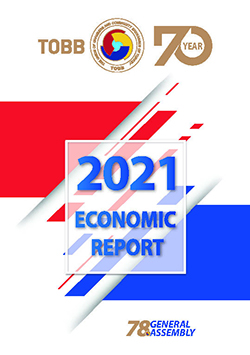Palandöken entrepreneurship summit final statement published

09.07.2021 / Erzurum
The final statement of the Palandöken Entrepreneurship Summit and the Consultation Meeting of the Provincial Young Entrepreneurs Boards of the Eastern Anatolia Region, organized by Erzurum Chamber of Commerce and Industry in partnership with TOBB Erzurum Young Entrepreneurs Board, was shared with the press and public.
The press conference held at Palandöken Polat Rönesans Hotel was attended by Faysal Açıkbas, TOBB Young Entrepreneurs Council (GGK) East Anatolia Regional Representative and Chairman of Bingöl Provincial Young Entrepreneurs Council, ETSO Deputy Secretary General Kürşat Karagöl, TOBB Entrepreneurship Manager Batuhan Demir and young entrepreneur council presidents and vice presidents from the region.
Following the speech of TOBB GGK East Anatolia Regional Representative Faysal Açıkbas and TOBB Entrepreneurship Manager Batuhan Demir, the final declaration of the summit hosted by ETSO was shared with the press and public by Haktan Ömeroğlu, Chairman of Erzurum Provincial Young Entrepreneurs Council.
The meeting, which was held in the form of three sessions, brought together important stakeholders of the entrepreneurship ecosystem, the statement said, adding that the main theme of the meeting was the problems experienced by entrepreneurs during the Covid-19 period.
“In the meeting where the public support provided during the pandemic period was evaluated, all stakeholders evaluated what can be done for the post-Covid-19 period with a participatory understanding and a common mind was tried to be established about what can be done in the short term.” Some of the issues that may be raised constituted the final declaration of the meeting.
Erzurum GGK Board Chairman Haktan Ömeroğlu read the following statement:
“The phenomenon of entrepreneurship is one of the most important building blocks of the economic system in our country as well as all over the world. Entrepreneurship, which has a great importance in increasing economic growth and social welfare, has become a phenomenon which has been emphasized and supported in our country in recent years. Both new entrepreneur candidates and existing entrepreneurs are supported by many institutions and organizations.
Despite these studies with great awareness and good intentions in the development of the entrepreneurship ecosystem, some problems are unsolved.
Among these problems are complexity in processes, bureaucratic obstacles and the failure to coordinate between institutions. Undoubtedly, coordination is needed to eliminate these problems. The creation of a coordination council composed of stakeholders of the entrepreneurship ecosystem will contribute to the faster resolution of problems.
In this sense, it is proposed to create an advisory and guidance council consisting of the directors of the stakeholder institutions and technical boards where detailed studies will be carried out by the council conducted by a particular secretariat.
With the developing technology and the processes experienced, the way they do business is changing day by day. The importance of communication has increased in new ways of doing business. Providing formal or informal communication will undoubtedly have a multiplier effect.
It is obvious that we can only get out of this extraordinary situation by developing collaborations and focusing on the concept of joint competition.
At this point, differentiated new structures and efforts are needed to strengthen the communication of entrepreneurs with entrepreneurs, entrepreneurs with the public and entrepreneurs with universities. Over time, it is expected that these communication networks, which can start informally, will become formal structures.
The establishment of this communication network is required by the declaration of intent and extra effort of all stakeholders.
The will of the public authority can have an accelerating effect in the creation of this network, which requires time. For this purpose, although guidelines and efforts are made to ensure public-university-industry cooperation, the expected effect locally cannot reach the desired levels.
It is thought that these networks of cooperation, which are the cornerstone of mutual trust and communication, can only benefit with this awareness internalized by all parties.
As in many subjects, a change in resource distribution has been observed in our country in recent years from central structure to decentralized structure. At this point, many locally funded institutions and organizations have been established and are trying to provide support within the framework of their legislation. However, the legislations of these organizations that provide project-based support bring many bureaucratic obstacles and complicate processes. This situation discouraged entrepreneurs and caused resources to be unavailable effectively.
Apart from bureaucratic hurdles, long project evaluation periods are not acceptable in dynamic business life. In this process, entrepreneurs have to wait or postpone their investment decisions. Prolonged evaluation and contract processes also cause the prices of goods and services to be taken within the scope of the project to change. Possible currency fluctuations change the prices of imported products, currency differences are a problem for projects and sometimes even prevent projects from starting.
With the arrangements to be made, the exchange rate differences that may occur in the projects should be financed from within the projects.
The Covid-19 period offered an opportunity for all segments make assessments and know themselves. It includes an adaptation process to new ways of doing business within entrepreneurs after Covid-19. In this period, entrepreneurship undoubtedly needs to be supported more. A thinking and evaluation phase of the post-Covid-19 period is the evaluation phase of the existing entrepreneurship ecosystem. How far can the current ecosystem carry us? All stakeholders should ask themselves these question. The role descriptions of all stakeholders within the current system need to be redefined.
The current situation is particularly frightening and costly for new and potential entrepreneurs. Entrepreneurs face many costs before they even implement their business ideas. In these processes, there is almost no mechanism to protect them. We need new models to support and protect new and potential entrepreneurs.
Many incentives are applied to increase exports in our country. As a region, although we have many businesses with export potential, we are not yet at the desired level in terms of exports.
In the post-Covid-19 period, while it is clear that e-commerce /exports will become increasingly widespread, it is necessary to eliminate the lack of knowledge of entrepreneurs about exports in order to turn this into an opportunity.
In order to increase exports, a systematic, sustainable and practical infrastructure should be created and supported for potential entrepreneurs. When planning this infrastructure, innovative approaches should be preferred instead of classical teaching techniques and based on a strategy. A holistic understanding planned by different institutions and organizations together should be observed.
Based on the fact that the main sector of our region is agricultural production and the food sector gained importance in terms of supply and competence issues during the pandemic process, it is recommended that our citizens who are engaged in agricultural activities and have a certificate of professional competence be considered insured within the scope of article 4 of the law no. 5510 and that their services should be evaluated over 30 days if they pay a 15-day period. With this application, it is thought that migration from village to city can be partially prevented, our young and female farmers can be encouraged, and the number of people receiving green card and social assistance benefits may decrease thanks to the conscious agriculture that will be formed by the necessity of vocational qualification certificates.
With this application, if the products produced in terms of sustainability can be evaluated and the sales marketing and branding stages can be harmonized with today's trading conditions, rural development prescriptions and support mechanisms will become more functional for our region with regional realities such as sectoral and demographic structure.”
Your message has been sent
Thank you |




